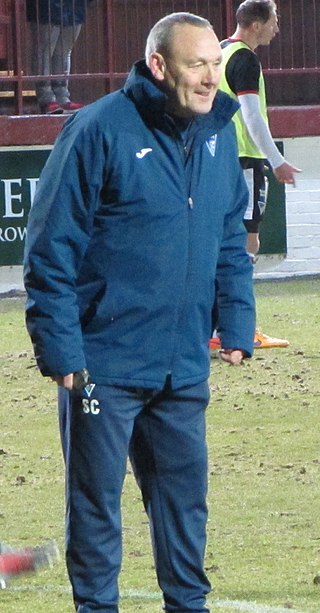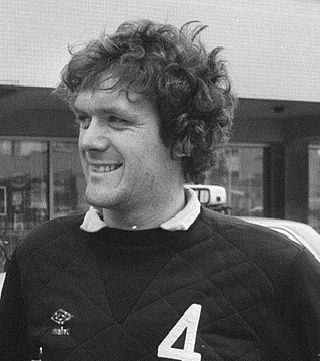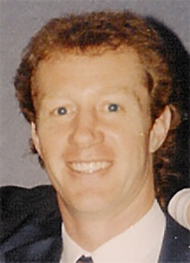
Aberdeen Football Club is a Scottish professional football club based in Aberdeen, Scotland. They compete in the Scottish Premiership and have never been relegated from the top division of the Scottish football league system since they were elected to the top flight in 1905. Aberdeen have won four Scottish league titles, seven Scottish Cups and six Scottish League Cups. They are also the only Scottish team to have won two European trophies, having won the European Cup Winners' Cup and the European Super Cup in 1983.

Alexander "Sandy" Clark is a Scottish professional football manager and former player who is currently manager of Scottish Lowland Football League club Albion Rovers.

Robert Sime "Roy" Aitken is a Scottish former football player and manager. He made over 480 league appearances for Celtic, and later played for Newcastle United, St Mirren and Aberdeen. Aitken also made 57 international appearances for Scotland. His playing position was either in midfield or defence.

James Michael Nicholl is a Northern Irish former professional footballer who played for several clubs, including Manchester United and Rangers. He was mainly a right-back but could also play in other defensive roles. Nicholl won a total of 73 international caps for Northern Ireland, scoring one goal.

The 2005–06 season was the 109th season of competitive football in Scotland.
Barry Nicholson is a Scottish former professional footballer, who played as a midfielder.

Colin John Nish is a Scottish former football player, coach and manager. Nish played for Dunfermline Athletic, Alloa Athletic, Clyde, Kilmarnock, Hibernian, Hartlepool United, Dundee, Dumbarton and Cowdenbeath. Whilst playing for Cowdenbeath, Nish was appointed player-manager of the Fife club. Following their relegation to Scottish League Two, Nish's contract was terminated. He subsequently managed Tranent Juniors for the 2022–23 season.

Derek John McInnes is a Scottish professional football manager and former player who is the manager of Scottish Premiership club Kilmarnock. He featured prominently for Greenock Morton, Rangers, West Bromwich Albion and Dundee United during his playing career. He won two caps for the Scotland national football team while with West Brom.
Darren Young is a Scottish football coach and former player, who currently manages Scottish League Two club Clyde.
Stuart Duff is a Scottish retired professional footballer who last played for Inverurie Loco Works in the Highland Football League. He was primarily a central midfielder although his versatility saw him play in most defensive and midfield positions.
Paul George Sheerin is a Scottish former football player and coach, who is currently the assistant manager of Kilmarnock.
The 2000–01 Scottish Premier League was the third season of the Scottish Premier League, the top level of football in Scotland. It began on 29 July 2000 and concluded on 20 May 2001.

Colin George Meldrum is a Scottish former professional goalkeeper and coach, who previously played for Kilmarnock, Livingston, Forfar Athletic and Motherwell. Whilst at the East Ayrshire club, Meldrum had loan spells at Stranraer and Ross County.
Jeffrey De Visscher is a Dutch former professional footballer who played as a winger
Aberdeen competed in the Scottish Premier League, Scottish Cup, Scottish League Cup and UEFA Cup in the 2007–08 season. It was the club's first season in European competition since 2002–03.
Aberdeen Football Club are one of Scotland's most successful football teams, with 17 major domestic trophy wins: four League titles with 17 runners-up finishes, seven Scottish Cups with nine final defeats, and six Scottish League Cups with nine final defeats. They are the only Scottish team to have won two European trophies – the European Cup Winners' Cup against Real Madrid on 11 May 1983 and the European Super Cup against the European Cup holders Hamburger SV in December 1983.
Aberdeen competed in the Scottish Premier League, Scottish Cup and Scottish League Cup during the 2008–09 season.
The 2009–10 season was Aberdeen's 97th season in the top flight of Scottish football. Aberdeen competed in the Scottish Premier League, Scottish Cup, Scottish League Cup and UEFA Europa League during the 2009–10 season.
Season 2010–11 for Hibernian was their 12th consecutive season of play in the Scottish Premier League. It was the first season played in the redeveloped Easter Road stadium, with its capacity increased to over 20,000 for the first time since it became an all-seater stadium in the early 1990s. The SPL season began on 15 August 2010 with a 3–2 win at Motherwell. Hibs competed in the UEFA Europa League, losing 6–2 on aggregate to Slovenian club NK Maribor. They also lost at the first stage of competition in the Scottish League Cup, losing 3–1 at Kilmarnock. Those cup defeats and a poor start to the league season led to manager John Hughes leaving by mutual consent in early October. Colin Calderwood was appointed as the new manager, but struggled to make any sort of impression, as they were knocked out of the Scottish Cup by Ayr United and fell into a relegation battle. A winning streak after the January transfer window meant any danger was quickly averted, but the team still finished in the bottom six.
Season 2011–12 for Hibernian was their 13th consecutive season of play in the Scottish Premier League (SPL). The season began on 24 July with a 2–0 home defeat by Celtic, who eliminated Hibs from the Scottish League Cup. With the club near the bottom of the league, manager Colin Calderwood was sacked and replaced with Pat Fenlon in November. Fenlon made several signings during January that helped the club to avoid relegation from the SPL. Hibs also reached the 2012 Scottish Cup Final, but this was lost 5–1 to local rivals Hearts.







